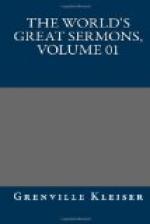EXCESSIVE GRIEF AT THE DEATH OF FRIENDS
But I would not have you to be ignorant, brethren, concerning them which are asleep, that ye sorrow not.—1 Thess. iv., 13.
We have occupied four days in explaining to you the parable of Lazarus, bringing out the treasure that we found in a body covered with sores; a treasure, not of gold and silver and precious stones, but of wisdom and fortitude, of patience and endurance. For as in regard to visible treasures, while the surface of the ground shows only thorns and briers, and rough earth, yet, let a person dig deep into it, abundant wealth discovers itself; so it has proved in respect to Lazarus. Outwardly, wounds; but underneath these, unspeakable wealth; a body pining away, but a spirit noble and wakeful. We have also seen an illustration of that remark of the apostle’s—in proportion as the outward man perishes, the inward man is renewed.
It would, indeed, be proper to address you to-day, also, on this same parable, and to enter the lists with those heretics who censure the Old Testament, bringing accusations against the patriarchs, and whetting their tongues against God, the Creator of the universe. But to avoid wearying you and reserving this controversy for another time, let us direct the discourse to another subject; for a table with only one sort of food produces satiety, while variety provokes the appetite. That it may be so in regard to our preaching, let us now, after a long period, turn to the blest Paul; for very opportunely has a passage from the apostle been read to-day, and the things which are to be spoken concerning it are in harmony with those that have lately been presented. Hear, then, Paul this day proclaiming—“I would not have you to be ignorant concerning them which are asleep, that ye sorrow not even as others which have no hope.” The parable of Lazarus is the evangelical chord; this passage is the apostolic note. And there is concord between them; for we have, on that parable, said much concerning the resurrection and the future judgment, and our discourse now recurs to that theme; so that, tho it is on apostolic ground we are now toiling, we shall here find the same treasure. For in treating the parable, our aim was to teach the hearers this lesson, that they should regard all the splendors of the present life as nothing, but should look forward in their hopes, and daily reflect on the decisions which will be hereafter pronounced, and on that fearful judgment, and that Judge who can not be deceived. On these things Paul has counseled us to-day in the passages which have been read to us. Attend, however, to his own words—“I would not have you to be ignorant, brethren, concerning them which are asleep, that ye sorrow not, even as others which have no hope. For if we believe that Jesus died and rose again, even so them also which sleep in Jesus will God bring with him.”—I Thess. iv., 13, 14.




